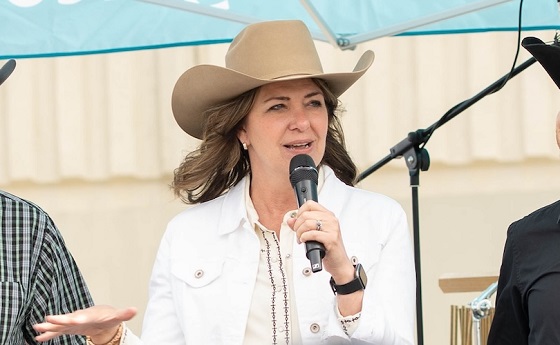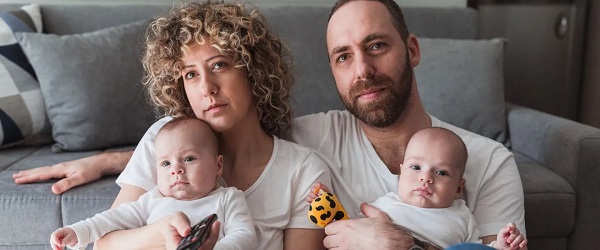Alberta
How an Alberta energy company voluntarily restores caribou habitat in northern Alberta

Helicopters dropping tree planters into forest corridors. This is not an image that typically comes to mind when we speak about energy production in Canada. Truth is, voluntary initiatives like the Caribou Habitat Restoration Project by Cenovus are very much part of everyday life for Alberta energy companies.
Let’s support our families, our neighbours, and our communities by taking a minute to learn about this particular effort. If you’re already well aware of the environmental focus of Alberta energy companies, you can help by sharing information like this with people you know and encouraging them to do the same. Just by taking the time to learn something new and sharing this information you are helping to make a difference at home in Alberta, across the country, and around the world! Thank you for supporting your community, your province, and your country!
Todayville is sharing this video as part of our #visionCanada2119 initiative.

From Cenovus Energy
Caribou Habitat Restoration Project
Our 10-year Caribou Habitat Restoration Project, announced in 2016, is a voluntary environmental initiative that represents the largest single area of boreal caribou habitat restoration undertaken by a company anywhere in the world.
We use proven reforestation techniques to restore old seismic lines, access roads and other linear disturbances. During 2017, we treated approximately 270 kilometres of these linear features in an area comprising about 276 square kilometres. Our restoration program is helping to reduce fragmentation in the Cold Lake caribou herd’s habitat, where our Foster Creek and Christina Lake oil sands projects are located.
Since 2013, we’ve cumulatively treated more than 700 kilometres of these linear disturbances and planted more than 850,000 trees. As part of our 10-year project, we plan to take that total to 3,500 kilometres treated within an area of 3,900 square kilometres – about five times the area of the city of Calgary. We plan to have planted approximately 4 million trees by 2026.
Our project uses techniques such as mounding the ground, planting trees on these mounds, adding woody debris and leaning tree stems into the pathways to help cover historical corridors cut into the forest for seismic work, access roads and other activities. By closing these long open stretches, our work aims to make it harder for wolves to hunt caribou. Woodland caribou are listed as threatened under Canada’s Species at Risk Act.
We continue to measure and monitor the results of our restoration work and share what we learn with others through Canada’s Oil Sands Innovation Alliance. For example, we’re a member of the Regional Industry Caribou Collaboration, where producers work collaboratively across individual company tenures and lease boundaries to coordinate habitat restoration in the Cold Lake and East Side Athabasca River caribou herds and conduct research on caribou ecology and how wildlife respond to habitat treatments. We also work on a coordinated caribou approach with our peers at the Canadian Association of Petroleum Producers.
Alberta
Danielle Smith slams Skate Canada for stopping events in Alberta over ban on men in women’s sports

From LifeSiteNews
The Alberta premier has denounced Skate Canada as ‘disgraceful’ for refusing to host events in the province because of a ban on ‘transgender’ men in women’s sports.
Alberta Premier Danielle Smith has demanded an apology after Skate Canada refused to continue holding events in Alberta.
In a December 16 post on X, Smith denounced Skate Canada’s recent decision to stop holding competitions in Alberta due to a provincial law keeping gender-confused men from competing in women’s sports.
“Women and girls have the right to play competitive sports in a safe and fair environment against other biological females,” Smith declared. “This view is held by a vast majority of Albertans and Canadians. It is also common sense and common decency.”
Women and girls have the right to play competitive sports in a safe and fair environment against other biological females.
This view is held by a vast majority of Albertans and Canadians. It is also common sense and common decency.
Skate Canada‘s refusal to hold events in… pic.twitter.com/n4vbkTx6B0
— Danielle Smith (@ABDanielleSmith) December 16, 2025
“Skate Canada‘s refusal to hold events in Alberta because we choose to protect women and girls in sport is disgraceful,” she declared.
“We expect they will apologize and adjust their policies once they realize they are not only compromising the fairness and safety of their athletes, but are also offside with the international community, including the International Olympic Committee, which is moving in the same direction as Alberta,” Smith continued.
Earlier this week, Skate Canada announced their decision in a statement to CBC News, saying, “Following a careful assessment of Alberta’s Fairness and Safety in Sport Act, Skate Canada has determined that we are unable to host events in the province while maintaining our national standards for safe and inclusive sport.”
Under Alberta’s Fairness and Safety in Sport Act, passed last December, biological men who claim to be women are prevented from competing in women’s sports.
Notably, Skate Canada’s statement failed to address safety and fairness concerns for women who are forced to compete against stronger, and sometimes violent, male competitors who claim to be women.
Under their 2023 policy, Skate Canada states “skaters in domestic events sanctioned by Skate Canada who identify as trans are able to participate in the gender category in which they identify.”
While Skate Canada maintains that gender-confused men should compete against women, the International Olympic Committee is reportedly moving to ban gender-confused men from women’s Olympic sports.
The move comes after studies have repeatedly revealed what almost everyone already knew was true, namely that males have a considerable innate advantage over women in athletics.
Indeed, a recent study published in Sports Medicine found that a year of “transgender” hormone drugs results in “very modest changes” in the inherent strength advantages of men.
Additionally, male athletes competing in women’s sports are known to be violent, especially toward female athletes who oppose their dominance in women’s sports.
Last August, Albertan male powerlifter “Anne” Andres was suspended for six months after a slew of death threats and harassments against his female competitors.
In February, Andres ranted about why men should be able to compete in women’s competitions, calling for “the Ontario lifter” who opposes this, apparently referring to powerlifter April Hutchinson, to “die painfully.”
Interestingly, while Andres was suspended for six months for issuing death threats, Hutchinson was suspended for two years after publicly condemning him for stealing victories from women and then mocking his female competitors on social media. Her suspension was later reduced to a year.
Alberta
Alberta’s huge oil sands reserves dwarf U.S. shale

From the Canadian Energy Centre
By Will Gibson
Oil sands could maintain current production rates for more than 140 years
Investor interest in Canadian oil producers, primarily in the Alberta oil sands, has picked up, and not only because of expanded export capacity from the Trans Mountain pipeline.
Enverus Intelligence Research says the real draw — and a major factor behind oil sands equities outperforming U.S. peers by about 40 per cent since January 2024 — is the resource Trans Mountain helps unlock.
Alberta’s oil sands contain 167 billion barrels of reserves, nearly four times the volume in the United States.
Today’s oil sands operators hold more than twice the available high-quality resources compared to U.S. shale producers, Enverus reports.
“It’s a huge number — 167 billion barrels — when Alberta only produces about three million barrels a day right now,” said Mike Verney, executive vice-president at McDaniel & Associates, which earlier this year updated the province’s oil and gas reserves on behalf of the Alberta Energy Regulator.
Already fourth in the world, the assessment found Alberta’s oil reserves increased by seven billion barrels.
Verney said the rise in reserves despite record production is in part a result of improved processes and technology.
“Oil sands companies can produce for decades at the same economic threshold as they do today. That’s a great place to be,” said Michael Berger, a senior analyst with Enverus.
BMO Capital Markets estimates that Alberta’s oil sands reserves could maintain current production rates for more than 140 years.
The long-term picture looks different south of the border.
The U.S. Energy Information Administration projects that American production will peak before 2030 and enter a long period of decline.
Having a lasting stable source of supply is important as world oil demand is expected to remain strong for decades to come.
This is particularly true in Asia, the target market for oil exports off Canada’s West Coast.
The International Energy Agency (IEA) projects oil demand in the Asia-Pacific region will go from 35 million barrels per day in 2024 to 41 million barrels per day in 2050.
The growing appeal of Alberta oil in Asian markets shows up not only in expanded Trans Mountain shipments, but also in Canadian crude being “re-exported” from U.S. Gulf Coast terminals.
According to RBN Energy, Asian buyers – primarily in China – are now the main non-U.S. buyers from Trans Mountain, while India dominates purchases of re-exports from the U.S. Gulf Coast. .
BMO said the oil sands offers advantages both in steady supply and lower overall environmental impacts.
“Not only is the resulting stability ideally suited to backfill anticipated declines in world oil supply, but the long-term physical footprint may also be meaningfully lower given large-scale concentrated emissions, high water recycling rates and low well declines,” BMO analysts said.
-

 Community2 days ago
Community2 days agoCharitable giving on the decline in Canada
-

 Alberta1 day ago
Alberta1 day agoCanada’s New Green Deal
-

 Business1 day ago
Business1 day agoCanada’s recent economic growth performance has been awful
-

 armed forces1 day ago
armed forces1 day agoOttawa’s Newly Released Defence Plan Crosses a Dangerous Line
-

 Alberta1 day ago
Alberta1 day agoAlberta’s huge oil sands reserves dwarf U.S. shale
-

 Health1 day ago
Health1 day agoSaskatchewan woman approved for euthanasia urged to seek medical help in Canada rather than US
-

 Health1 day ago
Health1 day agoCanadian gov’t considers sharing census data on gender-confused children
-

 Business1 day ago
Business1 day agoCOP30 finally admits what resource workers already knew: prosperity and lower emissions must go hand in hand






